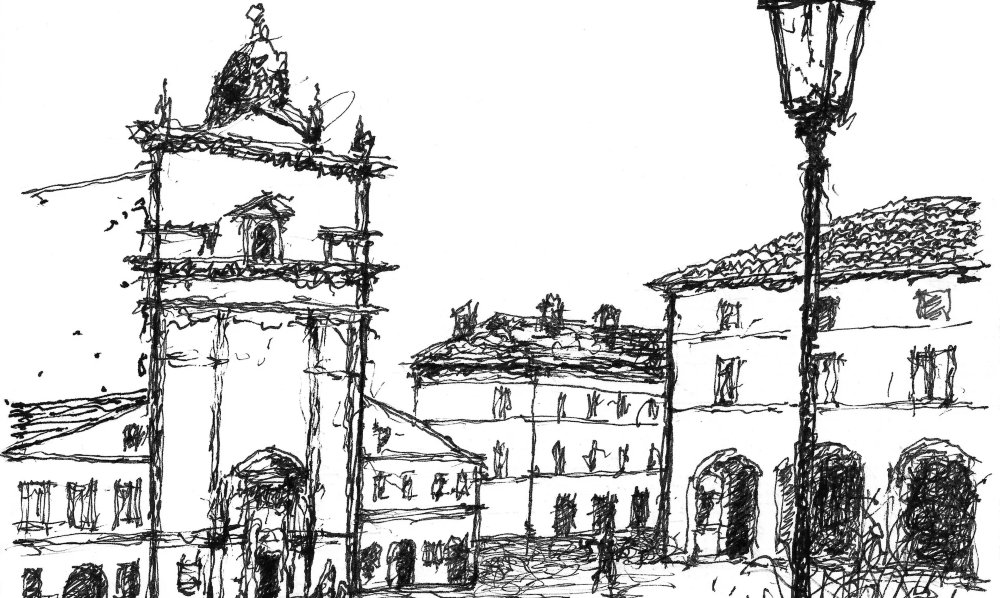Several years ago Seattle author, planner, and design critic Mark Hinshaw and his wife, herbalist Sunny Savino, made the momentous decision to retire in the Marche region, on the eastern slope of the Italian peninsula. Their new book, Navigating Paradise, describes this adventure so far.

The couple moved into a fixer-upper that was ready for its next life. Hinshaw has helped that happen and also contributed many posts to Post Alley in the years since.
In previous decades, Seattleites have beaten many paths to Italy and almost always count themselves better for it and encourage others to do the same. Hinshaw and Savino are clearly among them. They moved well before the pandemic and stayed put, enduring the twists and turns of it all from their own foreign perspective.
From barbershops to archaeological digs, Hinshaw describes a place where anything can happen, and time is layered—sometimes deeply. In Navigating Paradise, Hinshaw describes a moment when an archaeologist invites him to step down into an ancient room which is technically a ruin, and also to run his hand along the wall. Clearly, Hinshaw’s book is not about antiquities, law, or etiquette.
Nor antiquities. It’s mainly about people, and the many ways Italians welcome strangers into their communities and their daily lives. It’s also about the author, a retired architect, and the ways he encounters the streets and institutions of the place, as well as his new neighbors. It’s a little like Year in Provence.
I highly recommend his book, if only because it reflects the experience of an expat who knows the territory—here and there.
Discover more from Post Alley
Subscribe to get the latest posts sent to your email.

Curious, why the choice of the word “expat” when “immigrant” would do?
Sarah,
You raise an interesting question.
Yes, of course the difference is class & common usage — education, money, and factors such as intention, longevity, & freedom to choose.
Here’s a BBC discussion:
https://www.bbc.com/worklife/article/20170119-who-should-be-called-an-expat
I see the BBC story gives you many choices for how to define the distinction. I think they get closer when they talk about the means and motivations. It’s a grey area.
I personally am not in any hurry to return to the US, but like they say, it isn’t because of any serious personal danger or anything, and when I get old and frail, that might change. Or it might not. Am I an immigrant? Retired, no job, no family to raise here. I think that’s more or less the picture people have with “ex-pat.” “Immigrant” is correct also, but has a broader meaning and is thus less informative.
It’s an interesting exercise to call oneself an immigrant, and then shift to an expat, just to see how they make me feel. Big difference! I feel less control, more at the mercy of the government and inhabitants when I’m an immigrant. I feel wealthy and free to do what I want when I’m an expat.
How about acquiring the language and customs – do you feel like it’s more optional for the “expat”? There are places one may read about in for example Mexico, where for an American it might feel pretty much like home away from home. Those are expats, “immigrant” would be weird. It might be tempting to see this in some kind of social justice terms, but the same would be true if it were penniless hippies.
I feel like it comes from the unique place of being American or perhaps British. Have you ever heard the term ‘Japanese expat’ or ‘French expat?’ I don’t know, I feel like this term trades in American exceptionalism – I’m not saying it’s a ‘bad’ term necessarily but it does come with some baggage (or luggage? lol).
In Europe, of course it’s definitely British. Maybe Portugal has it worse than average in this respect, but they’re somewhat notorious in the southern coastal area in particular. If French had hung on as the world’s “lingua franca”, it would be the French instead.
Sarah,
Just something to consider:
https://www.internationalcitizens.com/blog/french-expats/
https://www.scmp.com/week-asia/people/article/3251414/more-japanese-expats-us-china-returning-home-amid-rising-costs-living